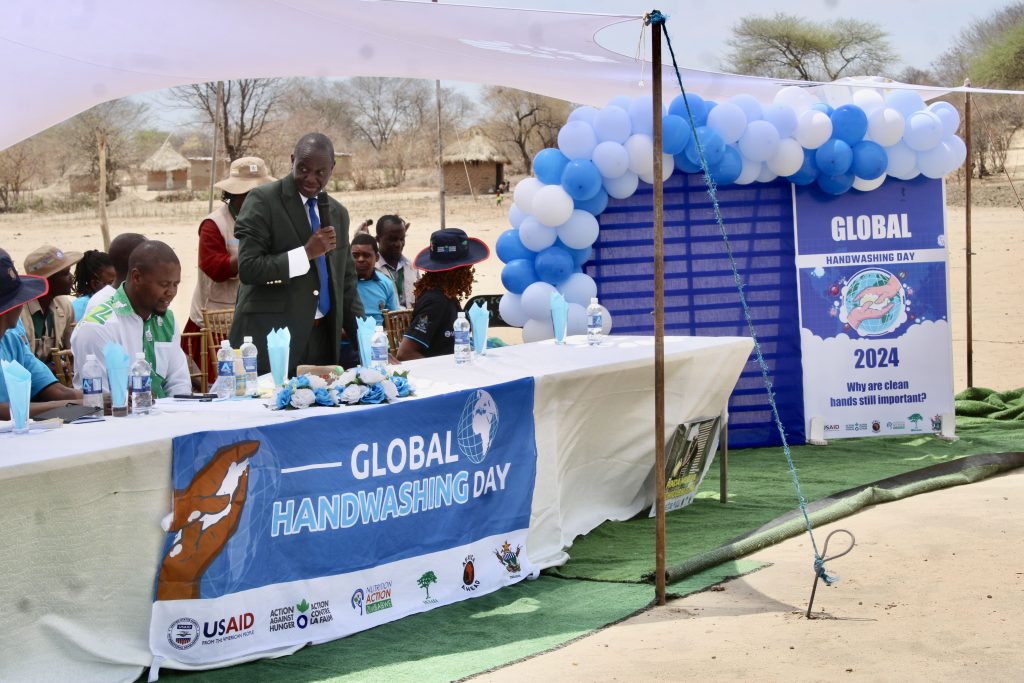Clean Hands Are Still Important!
by Maxine F. Kundishora
Importance of hand hygiene
Hand hygiene is fundamental to human health, yet it is often overlooked despite being a critical barrier against the spread of infectious pathogens. Hands are essential tools for daily activities but can also pose a threat to life if not properly and frequently washed. While handwashing may seem like a minor part of daily life, it is actually a decisive factor that determines health or illness and can even have life or death consequences.
Research shows that effective hand hygiene can prevent up to 50% of healthcare-associated infections (HAIs) in hospitals, where poor handwashing practices among healthcare workers lead to infection rates affecting 7–10% of hospitalized patients globally. (World Health Organization, 2021)
According to a study by Curtis & Cairncross (2003), the impact of handwashing on infectious disease risk in community settings revealed that promoting hand hygiene can significantly lower the incidence of respiratory and gastrointestinal illnesses. The findings indicated that interventions focused on hand hygiene, particularly handwashing with soap, led to a 21% decrease in respiratory infections and a 31% decrease in gastrointestinal infections.
Global Handwashing Day commemoration in Gokwe North District
To raise awareness on handwashing and the related risks of poor hygiene, Africa AHEAD, funded by the United States Agency for International Development (USAID) and in collaboration with the Government of Zimbabwe, Action Contre La Faim, Musasa and Nutrition Action Zimbabwe, hosted the 2024 Global Handwashing Day commemoration at the Chireya Dip Tank in Ward 5 of Gokwe North District, Midlands Province. This site, newly rehabilitated by the consortium, served as a fitting location to showcase the infrastructure developments done through the same USAID funded project.
The commemorative event, held on the 29th of October 2024, acknowledged Global Handwashing Day which is observed annually on the 15th of October. This year’s theme, “Why Are Clean Hands Still Important?” aimed to reinforce the significance of handwashing in preventing infectious illnesses. The event drew an impressive crowd, with around 250 attendees gathering to champion the cause and celebrate the power of handwashing.
The event was well-supported by various stakeholders, including the guest of honor, Assistant District Development Coordinator (DDC) Mr. W. Gwerevende; District Environmental Health Officer (DEHO) Mr. C. Mandima; and Provincial Water Sanitation Sub Committee (PWSSC) Chair Madam S. Chenda. Additionally, representatives from various line ministries and government departments, including the Ministry of Health and Child Care, the Ministry of Primary and Secondary Education, and the Ministry of Women Affairs, Department of Veterinary Services, Agriculture Rural Extension Services (AREX), Rural Infrastructure Development Agency (RIDA), Gokwe North Rural District Council (RDC), Department of Social Development, Ministry of Youth, Arts, Sports and Culture, Ministry of Information, the Zimbabwe Republic Police, local leadership, the community and various other stakeholders, highlighting a unified commitment to reinforcing hand hygiene across Gokwe North District.
During the commemoration, the DEHO Mr. Mandima highlighted the critical link between handwashing and health, “Imagine being sick simply from not washing your hands,” he remarked, urging the community to make proper hand hygiene a daily practice. “Let us reinforce the importance of thorough handwashing to truly eliminate germs by properly handwashing and not just go through the motions.”
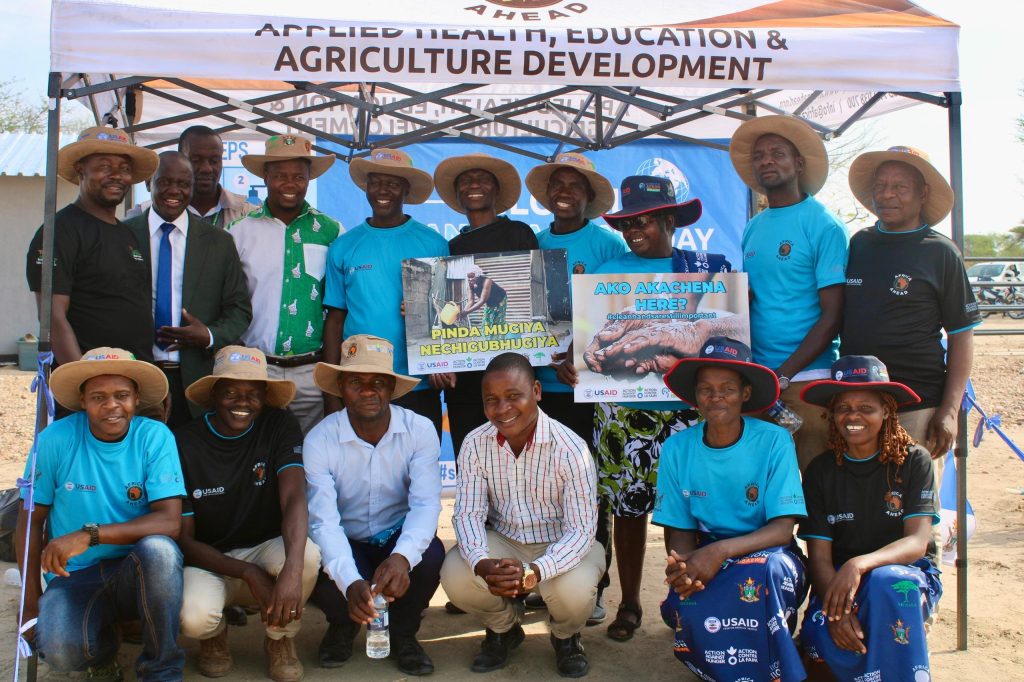
Some of the stakeholders at the Global Handwashing Day commemorations gathered for a group photo
Stakeholders emphasizing the impact of the commemoration
The guest of honor, Assistant District Development Coordinator (DDC) Mr. Gwerevende, emphasized the lasting impact of the handwashing commemorations. “This event carries a powerful message that: communities must embrace handwashing as a daily habit,” he stated. “By adopting this culture, we can boost the district’s productivity, as people will spend less time seeking healthcare for preventable illnesses and more time on productive activities that strengthen our community.”
Reflecting on the need to scale up handwashing initiatives, the District Environmental Health Officer Mr. C. Mandima stated, “It would be great for various government ministries, implementing and funding partners, advocacy boards and communities to come together, pool resources and amplify handwashing awareness events like this across all districts. This way, the impact of the awareness efforts can extend beyond this district.”
During his remarks, Ward 5 Councillor Mr. L. Ncube highlighted that, “The commemoration has raised awareness and empowered the community about the importance of hand hygiene. The community now understands the dangers of neglecting handwashing after defecation, having been educated on how fecal waste can accumulate under the fingernails and its implications related to diarrheal diseases.”
Educational demonstrations and community involvement
To reinforce that proper handwashing is important, environmental health personnel demonstrated proper handwashing techniques and shared practical tips on maintaining good hand hygiene, especially with limited resources. Many communities, particularly in low-income and rural areas, face significant barriers to effective handwashing. The use of tippy taps and ashes, suggested as a cost-effective alternative to soap, was the highlight of the presentations.
Assistant DDC Gwerevende remarked, “It is encouraging to see that the message of handwashing is applicable even in a rural setting, through the adoption of cost-effective alternatives as demonstrated by health personnel. This was a much-needed session and I commend our partners for their efforts.”
Participants in attendance were reminded of the importance of handwashing through live demonstrations following World Health Organization (WHO) guidelines, with additional emphasis on the Ministry of Health and Child Care’s recommended 10-step handwashing procedure.
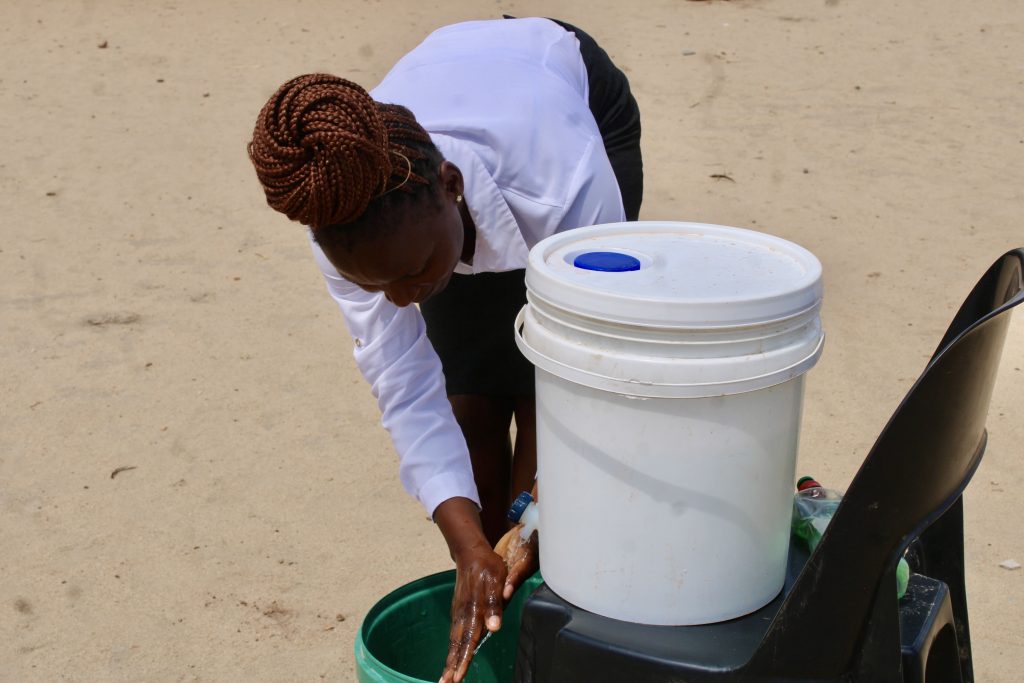
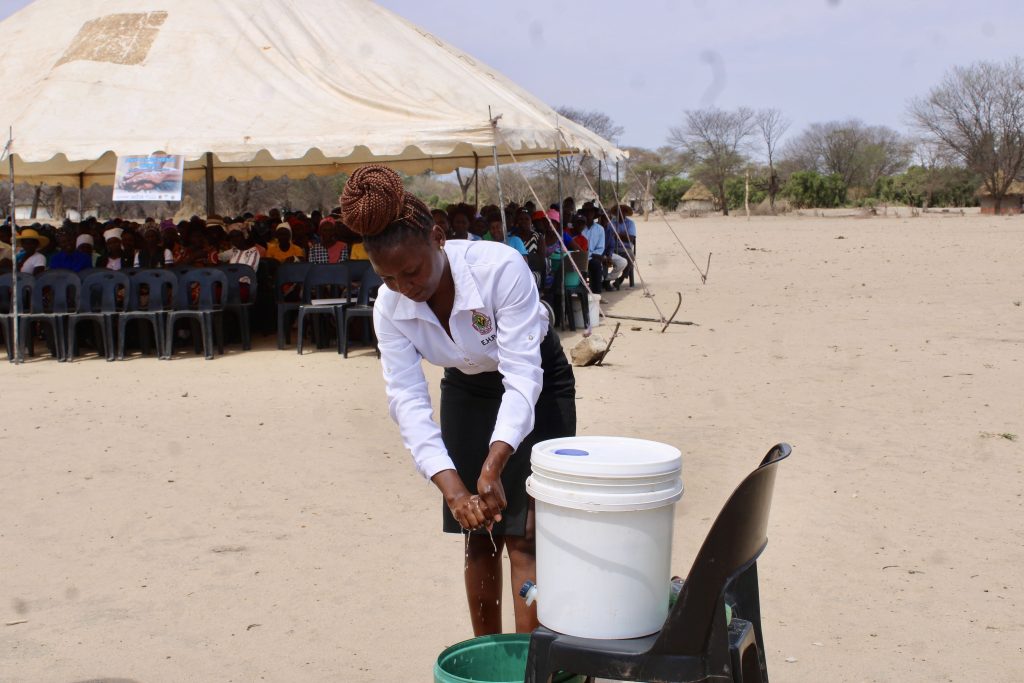
An Environmental Health Practitioner (EHP) from the Ministry of Health and Child Care demonstrating proper handwashing steps
Sibongile Magaya, a community member from Chireya village, shared, “I personally learnt that washing hands with soap and clean water while following the demonstrated steps, especially before meals and after using the toilet, can prevent illnesses. It was so simple but very important.”
Youth participation and education
Representatives from the Ministry of Primary and Secondary Education, school teachers and students from both primary and secondary levels were present, with primary school children from Chireya Primary School participating in poetry. A Grade 6 learner stated, “Handwashing is a simple habit that can save mankind from a lot of pain and suffering.”
While the assistant DDC Mr. Gwerevende, impressed by the youth’s involvement, remarked, “We must catch them young. It was wonderful to have presentations from the primary school children. In future events, it would be beneficial to engage children from both primary and secondary levels so they can learn from the demonstrations and help spread the message to their peers and even to their parents.”

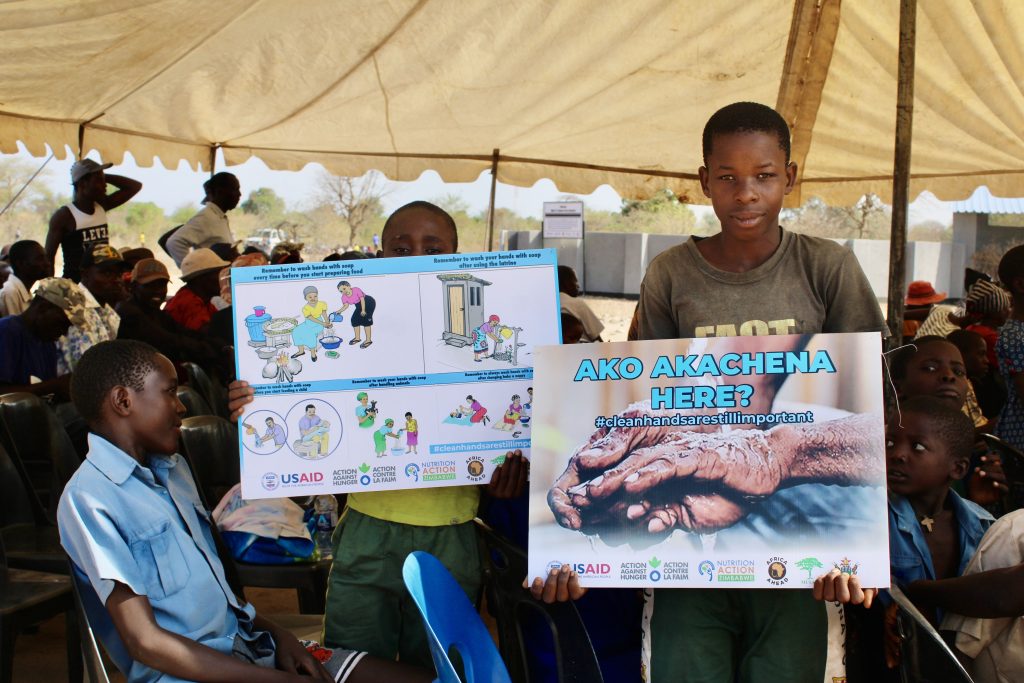
School learners and children from the community participating at the Global Handwashing Day commemorations, learning proper handwashing techniques to promote hygiene and prevent disease.
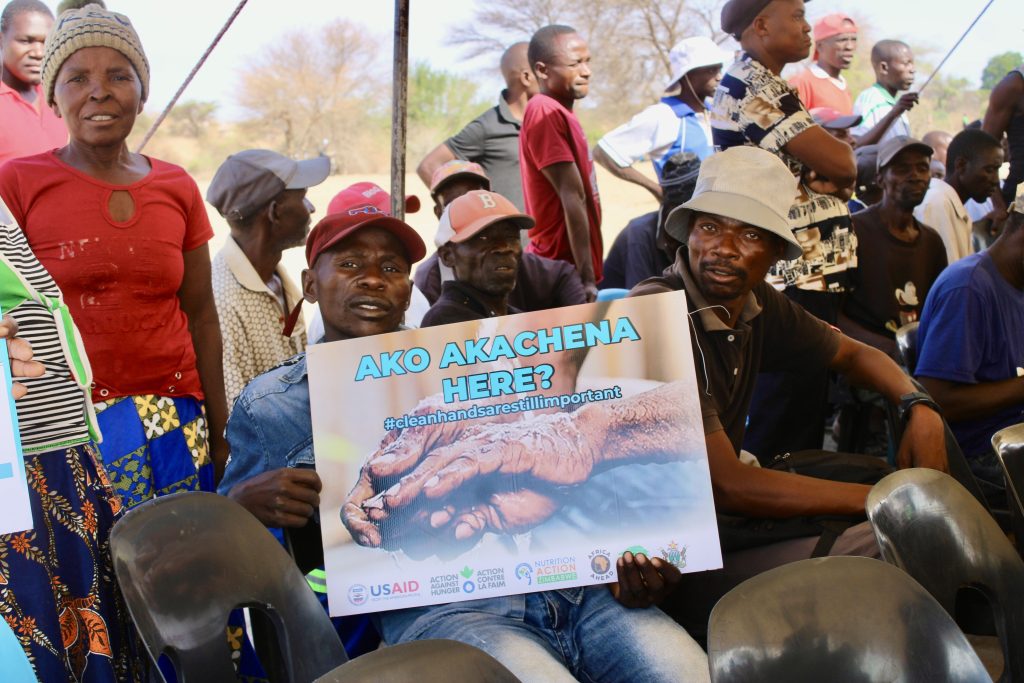
Capturing the moment: Members of the community actively engaged in learning about health practices.
Broader impact of hand hygiene and closing remarks
The event underscored how inadequate hand hygiene contributes significantly to the spread of infectious diseases. History has shown that hand hygiene plays a critical role in controlling outbreaks of diseases like Ebola, COVID-19, Cholera and Mpox, each of which has posed severe global health and socio-economic challenges.
By emphasizing the importance of consistent handwashing practices, the event highlighted how these simple actions can significantly reduce the risk of severe illness from preventable infections, ultimately promoting better health outcomes.
Mr. Gwerevende remarked about the event saying, “It was a well-collaborated event that truly resonated with the theme for the commemorations. It would be an honor to have more of these commemorations emphasizing the importance of handwashing and hand hygiene.”
Indeed, clean hands are still important. The success of the Global Handwashing Day commemorations in Gokwe North reflects the power of health initiatives to instill life-saving practices. By continuing to promote these practices, especially in vulnerable and rural communities, the invisible risk that poor hand hygiene poses can be reduced, building healthier communities in Zimbabwe and beyond.

